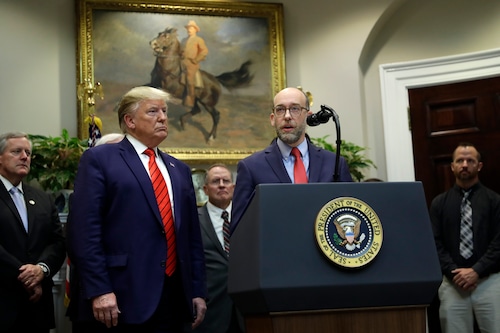Donald Trump, the president-elect, declared on Friday that he will appoint hedge fund manager Scott Bessent, who is a supporter of deficit reduction, as his next Treasury secretary.
Trump also said that he would appoint Russell Vought, who served in the Trump administration’s first term, to head the Office of Management and Budget. Throughout the campaign, Vought attempted to disassociate himself from Project 2025, a conservative plan for Trump’s second term.
The announcements demonstrated Trump’s efforts to develop his new administration’s financial aspects. Vought is a Republican hardliner, but Bessent is closely associated with Wall Street and might garner bipartisan support.
While Vought is well-equipped to destroy the Deep State and put an end to Weaponized Government, Trump claimed that Bessent will assist him in bringing about a new Golden Age for the United States.
Trump revealed a number of personnel decisions Friday night, including Bessent and Vought.
Trump claimed to have appointed former football player Scott Turner, who served in his first administration, as his housing secretary and Oregon Republican Rep. Lori Chavez-DeRemer as his labor secretary.
Trump completed his health team as well. He appointed Dr. Dave Weldon, a former Republican congressman from Florida, to head the Centers for Disease Control and Prevention; Dr. Marty Makary, a surgeon from Johns Hopkins, to head the Food and Drug Administration; and Dr. Janette Nesheiwat, a general practitioner and Fox News contributor, to be surgeon general. Trump had earlier declared that he would choose Robert F. Kennedy Jr., a longstanding propagandist of vaccination conspiracy theories, to the position of health secretary.
Sebastian Gorka will be the senior director for counterterrorism, while Alex Wong will be the main deputy national security adviser. Gorka is a conservative commentator who was in Trump’s White House for less than a year, and Wong worked on Asia-related topics during Trump’s first term.
Bessent, 62, founded Key Square Capital Management, a hedge fund, after intermittently working for Soros Fund Management since 1991. He would be the first openly gay Treasury Secretary in the country if the Senate confirmed him.
In August, he told Bloomberg that cutting government programs and other spending should be a top focus in order to combat the U.S. national debt.
He then stated that this election cycle is the last opportunity for the United States to grow its way out of this debt mountain without turning into a socialist democracy akin to that of Europe.
Both the Trump and Biden administrations contributed to the nation’s $35.94 trillion debt as of November 8. The Committee for a Responsible Federal Budget, a fiscal watchdog, estimates that the Biden administration increased the national debt by $4.3 trillion, while Trump’s actions increased it by $8.4 trillion.
Bessent has supported extending portions of the Tax Cuts and Jobs Act of 2017, which Trump signed into law in his first year in office, even as he works to reduce the national debt by halting spending. Numerous economic evaluations have estimated the price of the various tax cuts to be between almost $6 trillion and $10 trillion over a ten-year period. By the end of 2025, almost all of the law’s provisions will have expired.
Bessent made contributions to a number of Democratic causes in the early 2000s, most notably Al Gore’s presidential campaign, before joining Trump as an adviser and donor. Additionally, he was employed by George Soros, a prominent Democrat backer. His well-known 1992 wager against the pound, which produced enormous profits on Black Wednesday when the pound was decoupled from European currencies, was one of Bessent’s significant contributions to Soros’ London activities.
Bessent was one of the names put forth for the position of Treasury Secretary, thus his nomination wasn’t shocking. Trump referred to Bessent as one of the leading Wall Street experts at a Detroit Economic Club luncheon in October.
In August, Bessent told Bloomberg that tariffs will mostly target China during a second Trump presidency and that he sees them as a one-time pricing adjustment rather than an inflationary measure. Additionally, he stated in an opinion piece on Fox News this week that tariffs are a helpful instrument for accomplishing the president’s foreign policy goals, such persuading partners to increase defense spending or discouraging military aggressiveness.
Additionally, Bessent has offered suggestions on how the Trump administration may exert pressure on Jerome Powell, the chair of the Federal Reserve, whose tenure ends in May 2026. In an attempt to effectively sideline Powell, Bessent proposed last month that Trump designate a new chair early and allow that individual to serve as a shadow chair.
However, Bessent apparently abandoned that plan following the election. Powell has stated that, as president, Trump does not have the power to fire him and that he would not resign if Trump asked him to.
Powell was frequently criticized by Trump for hiking the Fed’s benchmark rate in 2017 and 2018 during his first time in office. He stated during the 2024 campaign that he ought to have a say in the central bank’s interest rate choices in his capacity as president. Historically, presidents have refrained from discussing the Fed’s policies.
After serving as the acting director and deputy director of the Office of Management and Budget, Vought, 48, led the agency from the middle of 2020 until the end of Trump’s first term in 2021. Having completed both Wheaton College and George Washington University Law School, he possessed a thorough understanding of government finances in addition to his personal Christian beliefs.
Following the conclusion of Trump’s first term, Vought established the Center for Renewing America, a think tank whose goal is to “renew a consensus of America as a nation under God.”
The Center for Renewing America unveiled A Commitment to End Work and Weaponized Government, its own budget proposal for 2023. To bring the budget into balance by 2032, the idea called for around $2 trillion in income tax cuts and $11.3 trillion in spending cutbacks over a ten-year period.
According to Vought’s introduction, the country’s current concern is that the government is becoming more and more militarized against the people it is supposed to represent, rather than the people themselves governing the country.
The Agriculture Department’s expenditure on food assistance would be reduced under Vought’s proposed budget plan. The distribution of Medicaid and Medicare funds would be a major factor in the $3.3 trillion in spending cuts in the Health and Human Services Department. It also includes cuts to the Affordable Care Act totaling roughly $642 billion. Additionally, the budgets for the departments of education and housing and urban development would be reduced.
Vought’s budget proposals were not influenced by Trump, who hasn’t fully disclosed his economic agenda beyond running on a platform of lower income taxes and higher tariffs.
The Associated Press
Note: Every piece of content is rigorously reviewed by our team of experienced writers and editors to ensure its accuracy. Our writers use credible sources and adhere to strict fact-checking protocols to verify all claims and data before publication. If an error is identified, we promptly correct it and strive for transparency in all updates, feel free to reach out to us via email. We appreciate your trust and support!



